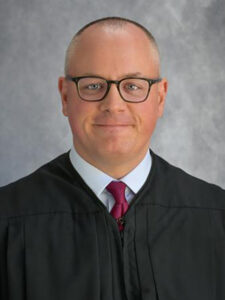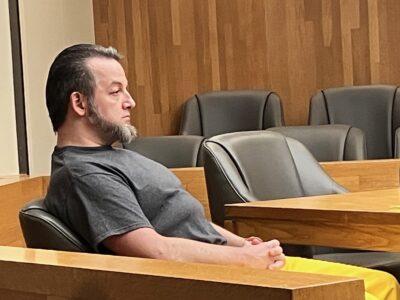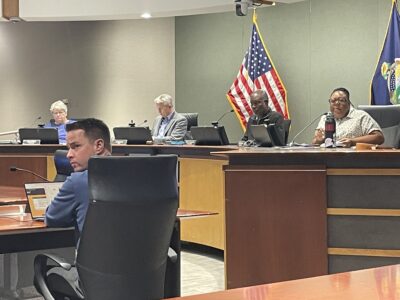Douglas County District Court celebrates opening of new Veterans Treatment Court
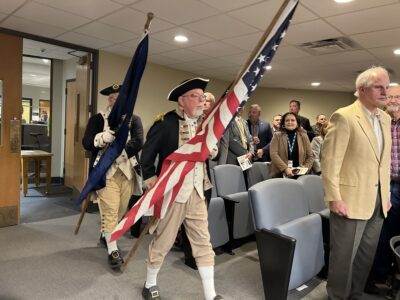
photo by: Rochelle Valverde/Special to the Journal-World
The U.S. and Kansas state flag are brought into the courtroom as part of the opening ceremony for the Douglas County Veterans Treatment Court on Wednesday, Oct. 22, 2025, at the Douglas County Judicial and Law Enforcement Center.
Standing before a banner with the motto “Leave no veteran behind,” Douglas County District Court Judge Amy Hanley hailed the court’s new Veterans Treatment Court as a second chance for veterans involved in the criminal justice system.
During the court’s opening ceremony at the Douglas County Judicial and Law Enforcement Center on Wednesday, Hanley, the court’s presiding judge, said Douglas County has been a leader in alternative courts. She said like the Behavioral Health Court and Drug Court, the Veterans Treatment Court goes beyond public safety.
“I’m proud to live in a community that supports these specialized courts because they offer hope and structure and a second chance,” Hanley told those gathered for the ceremony. “These alternative courts don’t just resolve cases or even just reduce recidivism. They restore people, and they make communities stronger.”
The Douglas County Veterans Treatment Court, the sixth in Kansas, is open to veterans who suffer from substance abuse, mental health issues or both related to their military service. The program, which operates in five phases, includes 15 to 18 months of intensive court supervision using evidence-based practices that seek to stabilize the needs of veterans that contribute to criminal behaviors. That includes support to achieve and maintain sobriety, develop new skills to cope with life stressors, and support with employment, school and volunteer work, according to an overview of the program.
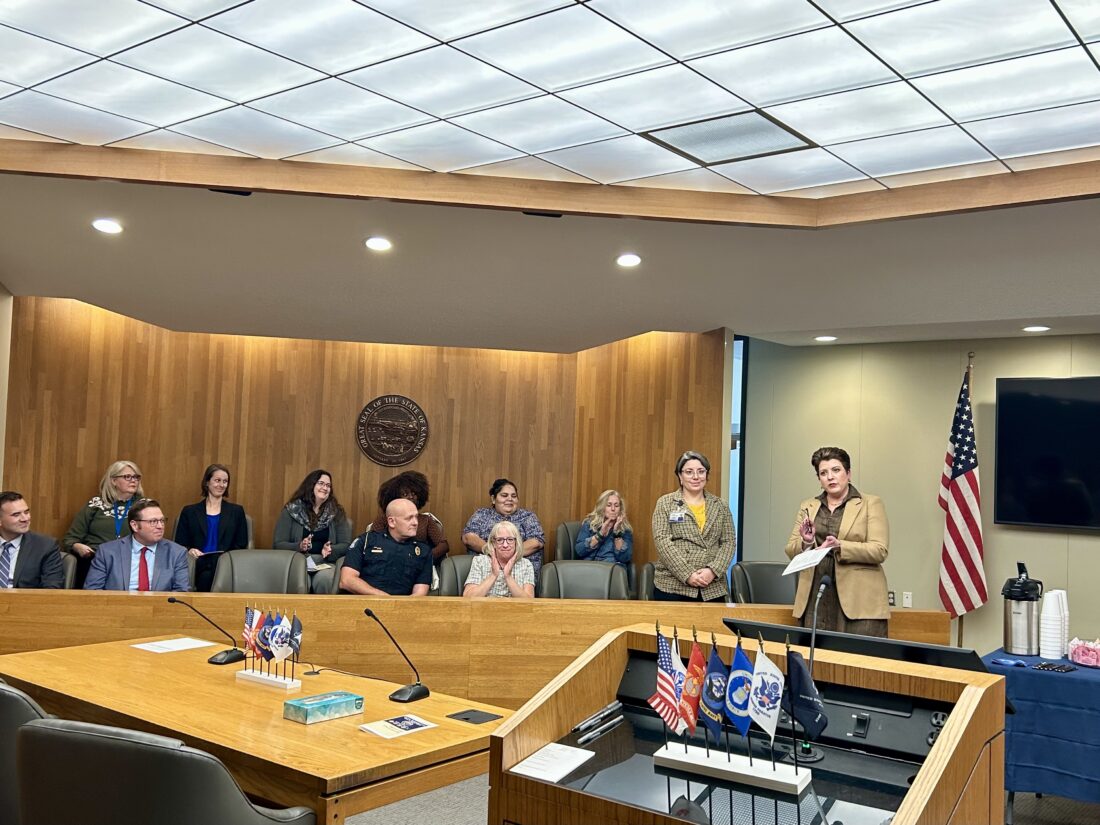
photo by: Rochelle Valverde/Special to the Journal-World
Douglas County District Court Judge Amy Hanley introduces members of the Veterans Treatment Court Team during the opening ceremony for the court on Wednesday, Oct. 22, 2025, at the Douglas County Judicial and Law Enforcement Center.
“(These specialized courts) represent a collaborative approach to justice that focuses on treatment, accountability and lasting community safety,” Hanley said. “These programs unite judges, attorneys, probation officers, treatment providers, law enforcement and all of our community partners in a shared mission of helping participants overcome their challenges and reducing recidivism.”
As part of the ceremony, Douglas County Drug Court graduate Timothy Shoulderblade spoke about how that alternative court impacted his life. Shoulderblade, who grew up on the Northern Cheyenne Indian Reservation in Lame Deer, Montana., said he had his first sip of alcohol when he was nine and started using drugs when he was 13. After getting into trouble, he moved to Tulsa, Oklahoma, and eventually, Lawrence. By that time, he said he was homeless and ended up getting charged with multiple felonies, including robbery, aggravated assault and battery. He said he applied for the Drug Court program after taking stock of his life and deciding to change.
“When I accepted my plea to get into the drug court, there was clapping upon my entrance,” Shoulderblade said. “I was just blown away, because I’ve been in several courtrooms and that was very different. Right then, I knew that this was going to be a different experience.”
Shoulderblade, who graduated from Drug Court in 2024, described the program as strict, grueling and hard, but ultimately he said he learned accountability as well as new coping skills. He said when he was faced with the possibility of using alcohol or drugs, he heard people from the program in his head.
“The whole Drug Court team, I had them in my ear when I was making decisions,” he said.
During the program, Shoulderblade got his driver’s license back, gained employment and earned his GED. He later graduated from Haskell Indian Nations University in 2025 with an associate’s degree in social work and plans to attend the University of Kansas to pursue a bachelor’s degree in social work. He currently works for Artists Helping the Homeless and leads Wellbriety, a recovery group geared toward Native Americans.
Hanley said the effort to launch the Veterans Court Program began two years ago, in 2023, and took a combination of the District Court, the District Attorney’s Office and the Office of Judicial Administration. In 2024, the District Court received a $1 million federal grant, which represents four years of funding for the program, as the Journal-World previously reported. Hanley said she hopes that will be the beginning.
“We have 10 spots available,” she said. “We hope to fill them quickly and add even more.”
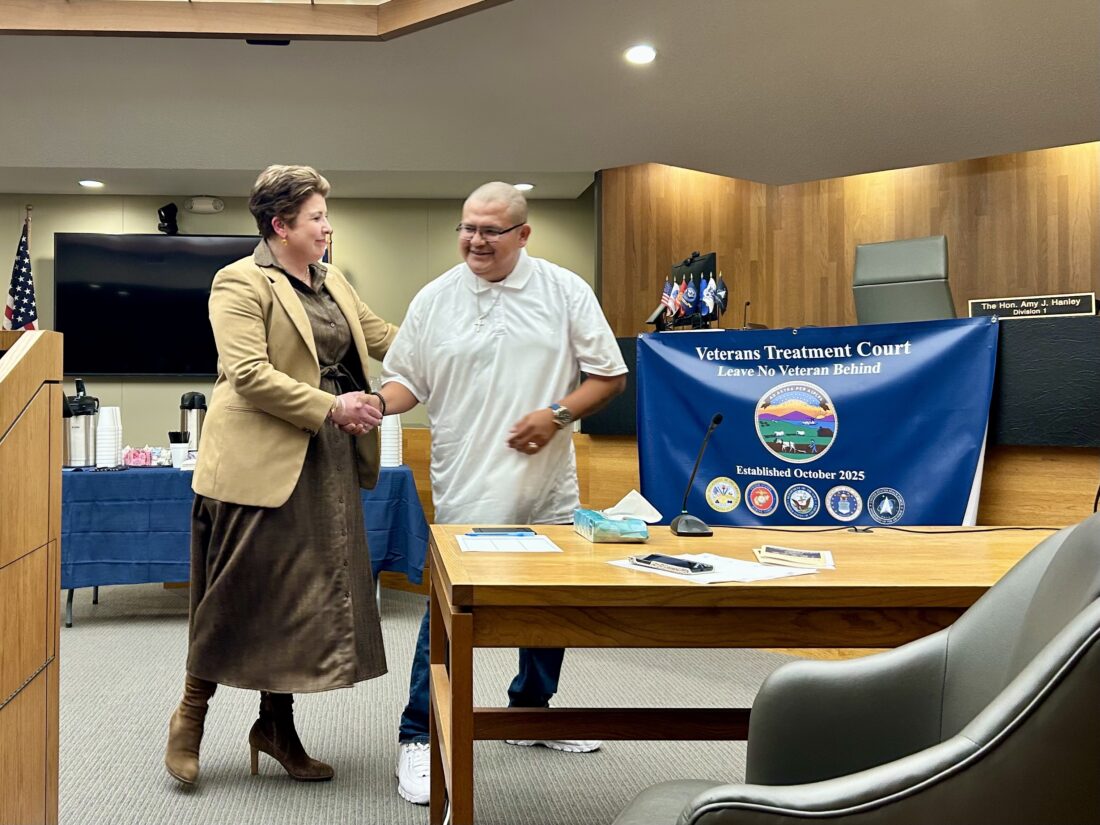
photo by: Rochelle Valverde/Special to the Journal-World
District Court Judge Amy Hanley shakes hands with 2024 Drug Court graduate Tim Shoulderblade.


